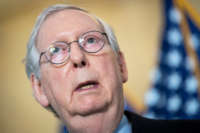This content originally appeared on The Real News Network and was authored by The Real News Network.
-
In the early 2000s, rampant steroid use across Major League Baseball became the biggest scandal in the sport’s history. But fans didn’t want to hear the difficult truth about their heroes – and the league didn’t want to intervene and clean up a mess it helped make.
We look back at how the scandal unraveled with our colleagues from the podcast Crushed from Religion of Sports and PRX. Their show revisits the steroid era to untangle its truth from the many myths, examine the legacy of baseball’s so-called steroid era and explore what it tells us about sports culture in America.
We start during the 1998 MLB season, when the home run race was on. Superstar sluggers Mark McGwire and Sammy Sosa battled to set a new single-season record, and McGwire, the St. Louis Cardinals first baseman, was portrayed as the hero baseball needed: part humble, wholesome, working man and part action hero, with his brawny build and enormous biceps. So when a reporter spotted a suspicious bottle of pills in his locker in the middle of the season, most fans plugged their ears and refused to acknowledge that baseball might be hooked on steroids.
Joan Niesen, a sportswriter and host of the podcast Crushed, takes us on a deep dive into an era that dethroned a generation of superstars, left fans disillusioned and turned baseball’s record book on its head. The story takes us from ballparks and clubhouses to the halls of Congress to explain how baseball was finally forced to reckon with its drug problem.
This is a rebroadcast of an episode that originally aired in July 2021.
Support Reveal’s journalism at Revealnews.org/donatenow
Subscribe to our weekly newsletter to get the scoop on new episodes at Revealnews.org/weekly
Connect with us on Twitter, Facebook and Instagram
This post was originally published on Reveal.
-
-
In the early 2000s, rampant steroid use across Major League Baseball became the biggest scandal in the sport’s history. But fans didn’t want to hear the difficult truth about their heroes – and the league didn’t want to intervene and clean up a mess it helped make.
We look back at how the scandal unraveled with our colleagues from the podcast Crushed from Religion of Sports and PRX. Their show revisits the steroid era to untangle its truth from the many myths, examine the legacy of baseball’s so-called steroid era and explore what it tells us about sports culture in America.
We start during the 1998 MLB season, when the home run race was on. Superstar sluggers Mark McGwire and Sammy Sosa battled to set a new single-season record, and McGwire, the St. Louis Cardinals first baseman, was portrayed as the hero baseball needed: part humble, wholesome, working man and part action hero, with his brawny build and enormous biceps. So when a reporter spotted a suspicious bottle of pills in his locker in the middle of the season, most fans plugged their ears and refused to acknowledge that baseball might be hooked on steroids.
Joan Niesen, a sportswriter and host of the podcast Crushed, takes us on a deep dive into an era that dethroned a generation of superstars, left fans disillusioned and turned baseball’s record book on its head. The story takes us from ballparks and clubhouses to the halls of Congress to explain how baseball was finally forced to reckon with its drug problem.
This post was originally published on Reveal.
-

Corporate America is clashing with GOP leaders over Georgia Republicans’ bill to overhaul voting laws, representing another break between the two forces that have long been closely aligned.
A slew of corporations have denounced the legislation over measures that civil rights groups argue that would restrict voting access for people of color. Delta Air Lines and Coca Cola, both headquartered in Georgia, are among some 100 companies to release statements opposing the bill. Major League Baseball moved its All-Star Game from Atlanta to Denver in response to outcry over the law.
Senate Minority Leader Mitch McConnell (R-Ky.) — a top beneficiary of political donations from business interests — made headlines this week when he issued a warning to corporate America to “stay out of politics.” He noted he wasn’t referring to political contributions.
“Most of them contribute to both sides, they have political action committees, that’s fine, it’s legal, I support that,” McConnell told reporters this week. “I’m talking about taking a position on a highly incendiary issue like this and punishing a community or a state because you don’t like a particular law they passed.”
McConnell later clarified that his statement, saying corporations are entitled to be involved in politics. He said corporate executives “ought to read the damn bill.”
The GOP leader’s criticism of corporations’ political statements — but not their donations — comes at a time when corporate America is increasingly allied with Democrats on social issues but continues to bankroll Republican campaigns.
Business PACs, funded primarily by business executives, gave 57 percent of their donations to Republicans in the 2020 cycle. McConnell was the No. 2 recipient of business PAC donations in the 2020 cycle, taking in $4.3 million. Only former Sen. David Perdue (R-Ga.) — the top recipient of Delta’s PAC donations — received more business PAC money.
For decades, McConnell has led the charge to deregulate campaign finance rules, culminating in the Supreme Court’s 2010 Citizens United Supreme Court decision that allowed corporations to directly donate to outside groups such as super PACs.
Most corporations stay away from these controversial donations. But the Senate Leadership Fund — Senate Republicans’ flagship super PAC closely aligned with McConnell — took in $31 million from corporations in the 2020 cycle, far more than any other outside group. Corporate donations to Republican outside groups totaled $85 million last cycle, compared to $23 million to Democratic groups, according to OpenSecrets’ corporate contribution data.
The McConnell-aligned super PAC spent $294 million to influence 2020 Senate contests, smashing spending records. The group received seven-figure corporate donations from several firms, including Chevron Corp, ConocoPhillips, Koch Industries and British American Tobacco. It also received $85 million from One Nation, a “dark money” nonprofit that hides its donors, leaving open the possibility of secret corporate giving. Business executives, including sports owners, have privately said they make anonymous political donations to avoid public backlash.
Corporations cannot directly donate to candidates at the federal level, but many states allow them to make corporate donations directly to state legislative candidates. Public Citizen reported this week that corporations and their PACs donated $22 million to state legislators who supported bills to restrict voting access in the 2020 cycle.
Still, many of these same corporations have denounced Georgia Republicans’ law that would give the state’s GOP legislature more power over election disputes, make it somewhat harder for Georgians to vote by mail and prohibit non-poll workers from providing food and water to voters waiting in line.
Democrats and voting rights advocates have attacked the latter measure, noting it would primarily impact Black Georgians, who are more likely than the state’s white residents to wait in long lines at polling places. They’ve also pointed out that election fraud is incredibly rare.
Corporations joined in opposition to the bill after a coalition of 73 Black business leaders, led by former American Express CEO Kevin Chenault and Merck CEO Ken Frazier, signed an open letter calling on corporate America to oppose the bill.
“As Black business leaders, we cannot sit silently in the face of this gathering threat to our nation’s democratic values and allow the fundamental right of Americans, to cast their votes for whomever they choose, to be trampled upon yet again,” the letter reads.
Republicans say that the law will impose necessary anti-fraud and election security measures. GOP lawmakers have advocated for passing retaliatory legislation to hit back against the corporations and former President Donald Trump called on his supporters to boycott the companies.
“Boycott baseball and all of the woke companies that are interfering with Free and Fair Elections. Are you listening Coke, Delta, and all!” Trump wrote in a statement.
Corporate America has broken with the GOP more frequently since Trump took control of the party. Dozens of corporations announced they would cut off PAC donations to GOP lawmakers who voted to contest the election results after Trump’s false claims of a stolen election led his supporters to storm the Capitol.
House Republican Conference Chair Liz Cheney (R-Wyo.) — one of 10 House Republicans to vote to impeach Trump — has emerged as an early top recipient of corporate PAC donations, while pro-Trump Republicans are getting next-to-nothing.
While corporate America is souring on Republicans over social issues and their embrace of Trump, Democrats aren’t a natural ally. President Joe Biden aims to pay for his $2 trillion infrastructure package by increasing taxes on corporations and cracking down on companies that avoid taxes by moving profits offshore. Big business groups have panned the proposal, arguing the proposed tax hikes would put the U.S. at a competitive disadvantage.
This post was originally published on Latest – Truthout.
